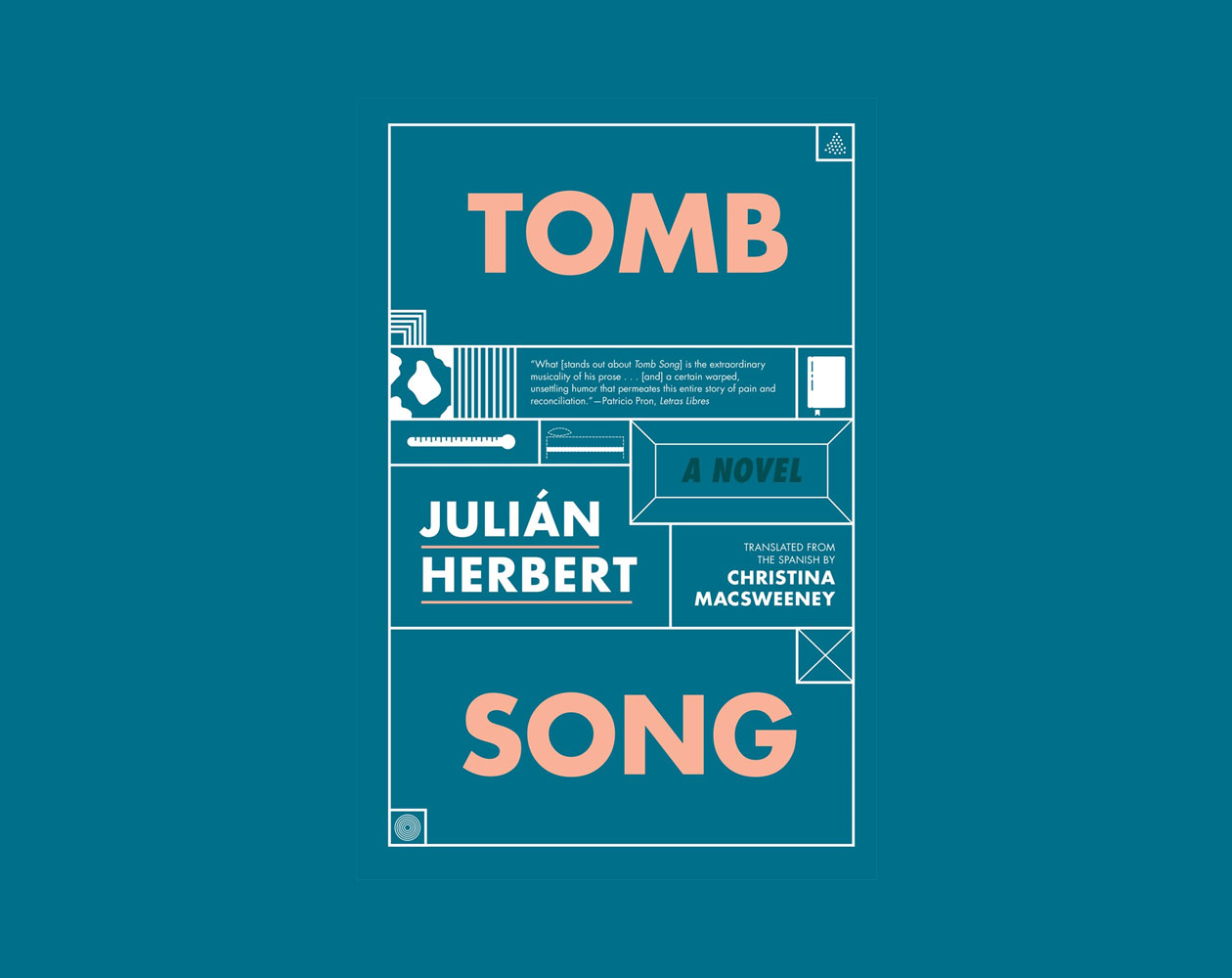The 2018 Rooster Summer Reading Challenge: Week One
We kick off our first book of the summer, Tomb Song by Julián Herbert, in conversation with Laura van den Berg and Rosecrans Baldwin.

Welcome to the 2018 Rooster Summer Reading Challenge. We’ve selected six Rooster-worthy works of fiction from 2018 to read over the next three months—two per month—and once a week we’ll meet back here to discuss our reading progress.
Each month we’ll be joined by a new judge, who will discuss the books with us and then select which of the two books that month heads to our summer finale at the end of August—where you, our readers, decide which novel wins the 2018 Rooster Summer Reading Challenge, and an automatic berth in the 2019 Tournament of Books. (And that counts for a lot, considering our 2017 summer winner, Fever Dream, stampeded through this year’s ToB, eventually taking home the Rooster.)
To select our summer books, each of our judges chose a work of fiction they’re particularly excited about this year. The other three books were selected by the ToB Committee according to our normal criteria—novels first published in English in the calendar year that we feel are excellent and interesting. (To avoid conflicts, none of the judges are assigned the books they select.)
A special thanks to our Sustaining Members for making another year of the Rooster Summer Reading Challenge possible. Find out why The Morning News and the Tournament of Books depend on your support, and please consider becoming a Sustaining Member or making a one-time donation.
This month we’re reading Tomb Song by Julián Herbert and An American Marriage by Tayari Jones, with novelist Laura van den Berg.
- See the reading list and discussion schedule
- Jump into today’s discussion in the comments
Please note: We receive a cut from purchases made through the book links in this article.
Rosecrans Baldwin: Welcome everybody to the Rooster Summer Reading Challenge! This month we’re joined by Laura van den Berg, whose new novel The Third Hotel will be published in August by Farrar, Straus and Giroux. Laura, thank you for joining us.
Laura van den Berg: Thank you!
Laura van den Berg is the author of the novel Find Me and two story collections, What the World Will Look Like When All the Water Leaves Us and The Isle of Youth. Her next novel, The Third Hotel, will be published by FSG in August. Laura lives in Cambridge, Mass., with her husband and dog.
Rosecrans Baldwin is a founding editor of The Morning News. He is the author of You Lost Me There and Paris, I Love You but You’re Bringing Me Down. His latest novel, The Last Kid Left, was one of NPR’s Best Books of the Year.
Rosecrans: We’re kicking off the summer with Tomb Song, published in translation, by Mexican poet and novelist Julián Herbert. It’s the story of a narrator named Julián, sitting by his dying mother’s bedside in the hospital, recounting what it was like to grow up as the son of a prostitute—and it goes in a bunch of surprising directions from there.
To start, Laura, what’s working for you? For me it’s the conversational narration, the resigned anger, all the childhood memories of this son-and-mother relationship. I really enjoyed anytime we were dipping back into the narrator’s life: the father figures that come through his life and his siblings’ lives; that early moment when the narrator’s a kid, sneaking out, and he’s watching the older guys play soccer until his mother takes him back to the room and asks him to watch over her while she sleeps. I was entirely moved, and that’s even before I learned that this is a “nonfiction novel,” as the author himself has said.
Laura van den Berg: I’m a sucker for an enthralling first-person voice—and holy cow does Tomb Song ever have one. The narrator is anguished and hilarious and insightful and surprising. On the first page, the line (Julián is speaking about his mother here) “However, she assumed a large number of aliases in her lifetime—both to give herself an air of mystery and because she views her existence as a criminal event” was a strong indicator that this novel would be right up my alley. So I’m really into the voice.
Rosecrans: And even when I don’t really care about what he’s getting into, like anything about the state of the contemporary novel.
Laura: I’m into the tormented mother-and-son relationship that sits at the novel’s center, and the claustrophobia of the hospital and his mother’s illness, of all that waiting, set against the rich expanse of memory. Also, this might sound weird but I think describing hospitals is very difficult—they are such artificial and disgusting and upsetting spaces, but there is a lot of banality there too, and the hospital descriptions in Tomb Song do a remarkable job of capturing that uniquely dislocating netherworld.
Rosecrans: Right? “Now I’m in the dark at my mother’s bedside, it’s night again, and the auditory blip of the hospital sometimes acts like a lie detector.” That’s great.
In the present day, Julián is deeply angry at his mother, deeply disappointed. And not just with his mother, he’s let down by Mexico’s corruption, his siblings, the literary world. The exhaustion that goes along with his frustrations just sweats out of this book—lots of dirt, lots of sweat, but also lots of beauty. I underlined this passage: “Cynicism requires rhetoric. Sitting in the sun doesn’t.” If you had to characterize our narrator, what stands out?
Laura: He’s a great observer. Like a lot of excellent first-person narrators, Julián is a great recorder of experience and human nuance. Those precise and harrowing hospital descriptions would be one such example. I sense there are so many things about his mother and their relationship he’s been grieving for a long time, which powerfully compounds the grief he feels as her death nears. And of course the narrator is also a writer. I spent quite a lot of time thinking about the line “I write in order to transform the perceptible.” I’m not completely certain of the meaning and yet felt—feel—instantly compelled and moved. I was reminded of this bit from Joy Williams’s essay “Uncanny the Singing That Comes From Certain Husks”: “The significant story possesses more awareness than the writer writing it. The significant story is always greater than the writer writing it.” The idea of transforming the perceptible seems, to me at least, connected to the idea of paying uncannily close attention, a kind of attention that is somehow beyond the author’s conscious control. Did that passage happen to catch your eye at all?
Rosecrans: You know, it didn’t. I think I have an extra-hard time when characters we know to be writers start sounding writerly. Do you know what I mean? I mean, he’s sitting in a chair next to his dying mother, pounding out this angry/compassionate book, all because he wants to transform something? Or is he doing it because he’s pissed and hurt and seized by compulsion? Or am I just being a dick?
Laura: Sometimes it bugs the heck out of me, when writer-as-narrator starts to sound writerly. But for some reason it didn’t here. I feel like some embrace of the artifice is necessary, you know? Which is to say that I don’t read this book as being written by his mother’s deathbed; rather that premise reads to me as another layer of the fiction.
Rosecrans: Like it’s somewhere in between, with layers added over time, during the editing process, in later reflection? I could see that. Actually, there’s a good segue here: Tomb Song came out in its original Spanish in 2014, Canción de tumba. What do you think of Christina MacSweeney’s translation? Do you have books you remember where you were really impressed by the translation?
Laura: I’m a really big fan of Christina MacSweeney’s work; her translations of Valeria Luiselli and Elvira Navarro come to mind right away. There are certain translators—MacSweeney, Susan Bernofsky, Jordan Stump—whose names will compel me to buy a book.
Rosecrans: Wow, that’s great. Can you recommend some titles?
Laura: I really loved Jordan Stump’s translation of Marie Ndiaye’s spectacular Ladivine and Tina Kover’s translation of Négar Djavadi’s Disoriental. Also, Deborah Smith’s translation of Han Kang’s The Vegetarian (a 2017 ToB competitor—ed.), even if that one did become somewhat controversial.

Sitting at the bedside of his mother as she is dying from leukemia in a hospital in northern Mexico, Julián is immersed in memories of his unstable boyhood and youth. As he wanders the hospital, he tells fevered stories of his life, from a trip with his pregnant wife to a poetry festival in Berlin to a drug-fueled and possibly completely imagined trip to another festival in Cuba. (Amazon / IndieBound / Powell’s)
Book description excerpted from publisher’s summary and edited for length.
Rosecrans: Julián’s mother is going to die. It’s inevitable from page one, and he’s typing his way through that, processing what occurs. I’ll admit I’ve already finished the book, and there’s a line in the last chapter that really roughed me up, but we’ll get to that later. Here’s my question: does that inevitability explain why this isn’t a dour or bitter book? Herbert said in an interview with the Paris Review, “There’s Julián the author, Julián the narrator, and Julián the character. It’s a metafictional hall of mirrors. I needed to write it that way. The story was so painful that I was afraid of blackmailing the reader with my pain.”
Laura: That quote from Herbert makes total sense to me—I think even the most autofiction-y works must require some measure of pure invention. But like you, I’m not finding Tomb Song dour or bitter at all—and when books do read as dour or bitter I’d argue it’s not difficulty of the subject matter, but rather a lack of style and originality and rigor. A lack of dimension. I adore Thomas Bernhard’s novel The Loser, and that book is bitter af—but of course it holds many more dimensions beyond the bitterness. And Tomb Song—so grief-soaked, and also grimly funny and playful and furious and intimate and weird and and and…
Rosecrans: Have you read My Prizes? I think it manages to be even more bitter than The Loser, but also less compelling.
Laura: I have not! Though I confess to being intrigued by a novel that tops The Loser bitterness-wise.
Rosecrans: I like thinking about Bernhard here, if only because, similar to one of his books, it took me a little while to find a way into Tomb Song. All the disjointedness. It’s very jumbled, and sometimes I’d put the book down and get something to eat and forget about it, and I’d come back a day later and not remember a thing. But once I started getting into the rhythm, the rambling, especially the further we moved away from the hospital—I learned how to read it, if you know what I mean.
Laura: I didn’t so much myself—but I do know what you mean! There’s a lot of skipping around in time and space and also there’s a density to the prose that requires a particular kind of attention. I divide books by those that I can read on the subway—
Rosecrans: I miss subway reading.
Laura: —and those I need to read at home, where I can go on for a long stretch and there are minimal distractions. (Unless my dog decides it’s time to go to the park. He once crawled into my lap while I was reading, bit down on the book, and pulled it straight out of my hands—very resourceful!) These categories aren’t value judgments, but just a practical way to decide what to read when, and Tomb Song immediately struck me as a “home book.” Do you read different books in different places or at different times?
Rosecrans: Books that are tricky to follow, I like to read while walking, to help maintain attention. Novels I sink into, I try to save for when I can just disappear into a couch until I finish them. I love really magazines on planes, and I like reading nonfiction think pieces on my phone at a bar. It’s actually one of my favorite side pleasures of reading: remembering where and when I read a certain book. Do you do that? I remember reading Middlemarch walking laps around my yard in the summer in Chatham County, North Carolina, swatting gnats, getting angry with George Eliot for spending 30 pages on agricultural theory.
Laura: I am in awe that you can read while walking. I would literally fall over. But yes, I do have very tactile memories of where I read, or finished reading, a particular book. The last book I really loved I finished in the Boston Commons, sobbing on a park bench. I love how those spatial associations can become a kind of map of your life: where were you, what were you doing, what was going on.
Rosecrans: And now I need to know: What was that book?
Laura: Sigrid Nunez’s The Friend!
Rosecrans: No shit! Well, we’ll be reading that one later this summer. For now we’ll press pause and turn to the commentariat: How’s Tomb Song going for you? Let us know in the comments, and we’ll see you back here next week for the novel’s second half. Thanks!
Subscribe to the Rooster newsletter
You will receive email from The Tournament of Books. Opt out at any time. (View our privacy policy.)

